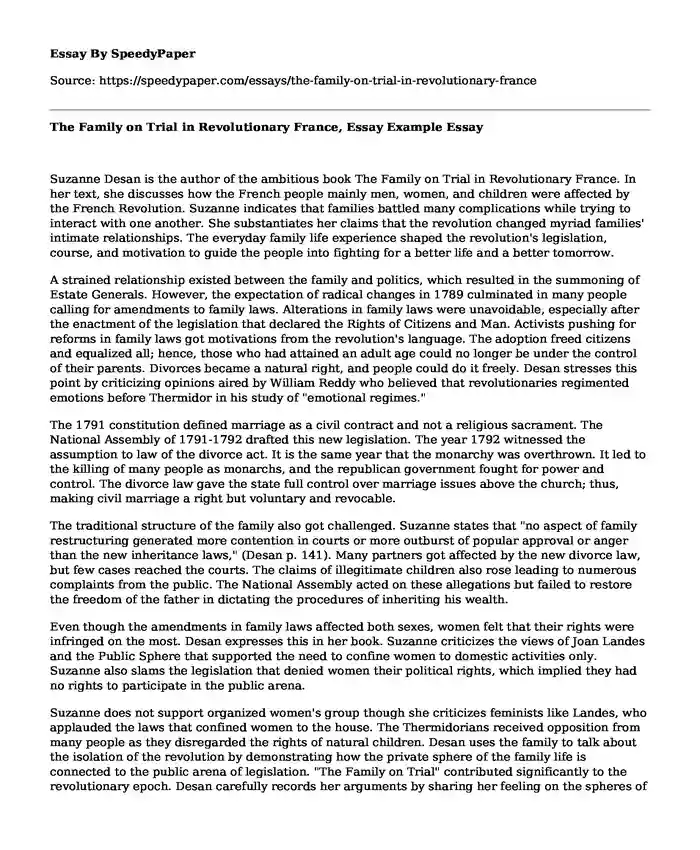
| Type of paper: | Book review |
| Categories: | French Revolution |
| Pages: | 3 |
| Wordcount: | 599 words |
Suzanne Desan is the author of the ambitious book The Family on Trial in Revolutionary France. In her text, she discusses how the French people mainly men, women, and children were affected by the French Revolution. Suzanne indicates that families battled many complications while trying to interact with one another. She substantiates her claims that the revolution changed myriad families' intimate relationships. The everyday family life experience shaped the revolution's legislation, course, and motivation to guide the people into fighting for a better life and a better tomorrow.
A strained relationship existed between the family and politics, which resulted in the summoning of Estate Generals. However, the expectation of radical changes in 1789 culminated in many people calling for amendments to family laws. Alterations in family laws were unavoidable, especially after the enactment of the legislation that declared the Rights of Citizens and Man. Activists pushing for reforms in family laws got motivations from the revolution's language. The adoption freed citizens and equalized all; hence, those who had attained an adult age could no longer be under the control of their parents. Divorces became a natural right, and people could do it freely. Desan stresses this point by criticizing opinions aired by William Reddy who believed that revolutionaries regimented emotions before Thermidor in his study of "emotional regimes."
The 1791 constitution defined marriage as a civil contract and not a religious sacrament. The National Assembly of 1791-1792 drafted this new legislation. The year 1792 witnessed the assumption to law of the divorce act. It is the same year that the monarchy was overthrown. It led to the killing of many people as monarchs, and the republican government fought for power and control. The divorce law gave the state full control over marriage issues above the church; thus, making civil marriage a right but voluntary and revocable.
The traditional structure of the family also got challenged. Suzanne states that "no aspect of family restructuring generated more contention in courts or more outburst of popular approval or anger than the new inheritance laws," (Desan p. 141). Many partners got affected by the new divorce law, but few cases reached the courts. The claims of illegitimate children also rose leading to numerous complaints from the public. The National Assembly acted on these allegations but failed to restore the freedom of the father in dictating the procedures of inheriting his wealth.
Even though the amendments in family laws affected both sexes, women felt that their rights were infringed on the most. Desan expresses this in her book. Suzanne criticizes the views of Joan Landes and the Public Sphere that supported the need to confine women to domestic activities only. Suzanne also slams the legislation that denied women their political rights, which implied they had no rights to participate in the public arena.
Suzanne does not support organized women's group though she criticizes feminists like Landes, who applauded the laws that confined women to the house. The Thermidorians received opposition from many people as they disregarded the rights of natural children. Desan uses the family to talk about the isolation of the revolution by demonstrating how the private sphere of the family life is connected to the public arena of legislation. "The Family on Trial" contributed significantly to the revolutionary epoch. Desan carefully records her arguments by sharing her feeling on the spheres of public and intimate life. She goes ahead to talk about the impact of the revolution on women, whom she considers the group that the revolution significantly affected.
Cited Work
Desan, Suzanne. "The French Revolution and the family." A Companion to the French Revolution (2014).
Cite this page
The Family on Trial in Revolutionary France, Essay Example. (2022, Apr 20). Retrieved from https://speedypaper.com/essays/the-family-on-trial-in-revolutionary-france
Request Removal
If you are the original author of this essay and no longer wish to have it published on the SpeedyPaper website, please click below to request its removal:
- Free Essay on Children With Special Needs Inclusion
- My Professional Behavioral Statements, Essay Sample
- Free Essay: Purpose and Value of Integrated Marketing Communications
- Free Essay on Pride and Prejudice
- Principles of Sensory Science Final Free Essay
- Free Essay on The Origin of The Earth
- Paper Example - The Lives of the Peasants
Popular categories




